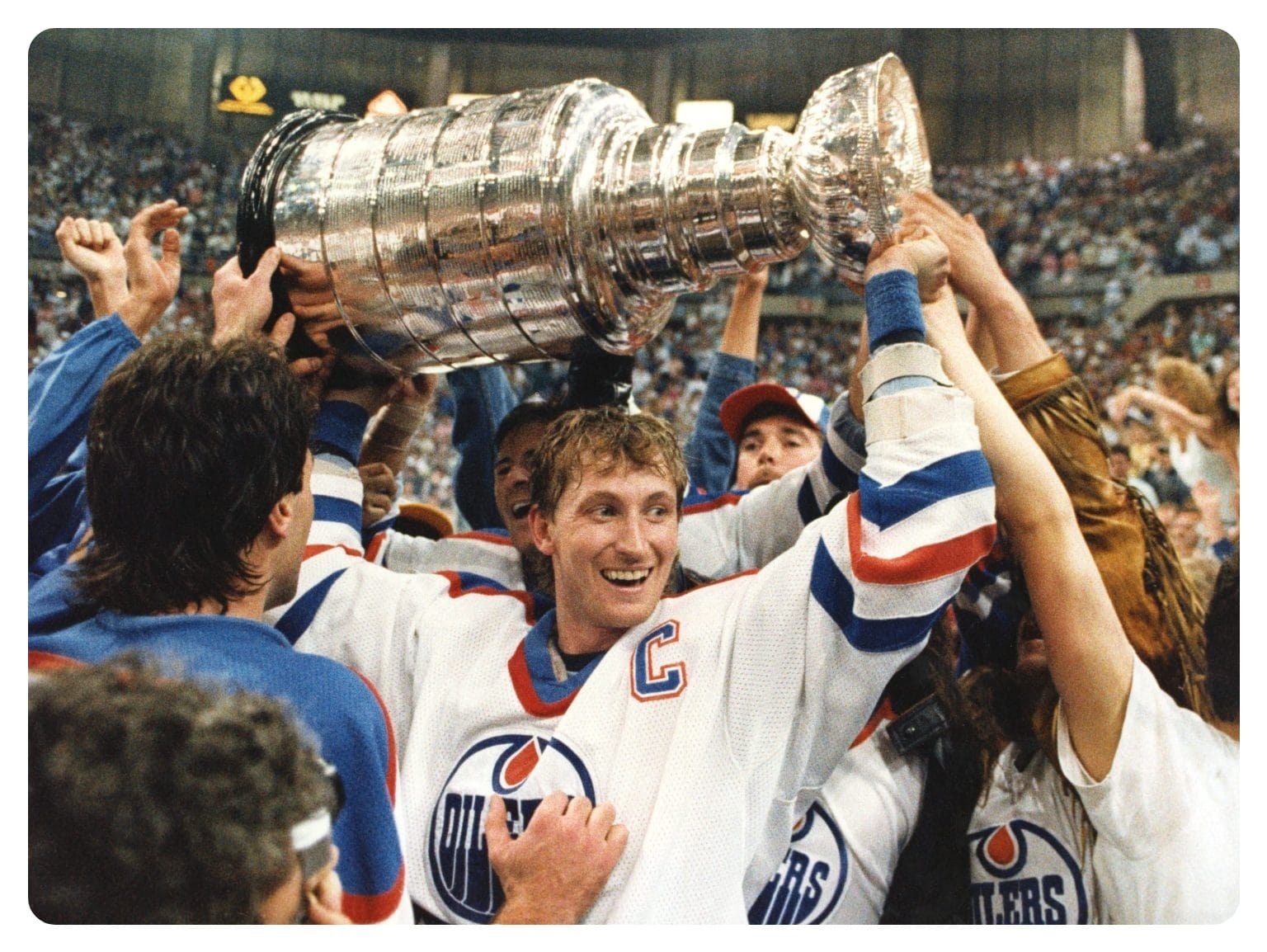Beating Gretzky's Most Goals Record

At a Glance
- What are Gretzky's Records?
The Great One holds 61 NHL records across the regular season, playoffs, and All-Star games. - Can Anybody Break the Record?
Alex Ovechkin is nearing Gretzky's career goal-scoring record, and younger players like Connor McDavid are showing promise, so who can break the record? - What Does the Data Say?
Statistical models incorporating scoring trends, age-related decline, and career longevity provide insights into the likelihood of players breaking the all-time records.
What are Gretzky's Records?
Wayne Gretzky is synonymous with NHL greatness. From 1978-79 to 1998-99, Gretzky amassed achievements that transformed the game. According to Sporting News:
When Gretzky retired in 1999, he held 61 different NHL records — 40 for the regular season, 15 for the playoffs and six in All-Star Games.
During that time, he also managed to win 4 Stanley Cups, all while playing with the Edmonton Oilers – the dynasty of that time.

Some of his notable records during his career are as follows:
- Career Goals: 894
- Career Assists: 1,963
- Career Points: 2,857
- Single-Season Goals: 92 (1981-82)
- Single-Season Assists: 163 (1985-86)
In a recent newsletter entitled From Chalkboards to AI: 108 Years of NHL Hockey (from our Vintage Hockey series), we broke out the NHL history into five eras, one of which was called "The Great One" era – because this was the era of Wayne Gretzky. You can see on the chart below (showing the number of expansion teams across the NHL's 108 year history) that this was a significant period of growth for the NHL, which has given way to today's modern game.

Gretzky’s dominance coincided with this expansion, the rise of the enforcer era, and significant advancements in training and equipment. His vision, precision, and ability to elevate teammates set him apart. Even decades after his retirement, his records remain untouchable for most.
However, one record, the 894 career goals, stands as both a testament to Gretzky's brilliance and a tantalizing challenge for current players. Let’s examine who might break this iconic mark.
Can Anybody Break the Record?
Our first step was to take a sampling of players that were either in close or off-in-the-distance striking range. Focusing on Regular Season Goals, we analyzed active player stats to see who might challenge Gretzky. We calculated their Goals per Season and then projected the number of games and/or seasons that player would need to break the record.
The resulting table summarize Goals, Seasons, Goals per Season, and critically 1) Goals Needed and 2) Seasons Needed (based on their total goals per season) to achieve those goals – all towards breaking Gretzky's record. Now, of course any one of these players could have stand-out seasons and that could make the difference, but for some it just wouldn't matter.

The heatmap is sorted on Seasons Needed from lowest to highest, so you can evaluate how many seasons are needed to break Gretzky's record based on the amount of seasons played. For example, Nicklas Backstrom has played 17 seasons, so it's unlikely he'll break the record given he'd need to play another 39 seasons.
So, who can beat Gretzky's goal record?
Ovechkin’s Quest
Alex Ovechkin, or "Ovi", is the closest. At the time of our data pull, he needed just 28 goals to surpass Gretzky. Assuming he maintains his career average of 0.60 goals per game, he could achieve this milestone within the next 50 games, assuming he recovers from his recent injury. The number of seasons he would need to break the record is 0.65 of a season. Thus, if Ovi can return in a reasonable timeframe and continues with his .60 goals per game, he should beat the record this year.

McDavid’s Trajectory
Connor McDavid, known for his explosive speed and scoring prowess, has the potential to challenge Gretzky over a more extended period of time. However, with 565 goals needed, McDavid would need just under 14 seasons to break the record – provided he maintains his current production for the rest of his career.

And while a bit of a long shot, we believe that he could do it. However, we also believe that when it comes time, he'll be chasing Ovi's record and not Gretzky's.
Long Shots
Players like Sidney Crosby and Steven Stamkos are prolific but face challenges due to their career stages and injury histories. While their contributions are significant, Gretzky’s record remains out of reach. Another possibility was Leon Draisaitl, though our calculations showed him as a lower possibility.
But let's get beyond our opinions and see what the numbers say about who on that list might beat Gretzky's goal scoring record.
What Does the Data Say?
We created a statistical model that used the data in the earlier table. There are a lot of variables that can impact a player's career – especially when you're building forecasts, so we added 1) an age weight that factored in a natural decline with each season and 2) a maximum career threshold of 25 years. The goal was to produce a probability that a given player would beat Gretzky's record of 894 goals based on their historical and future scoring trends and remaining career length.
The way the age decay factor worked was that for every future year of play, we assessed a 1% decline in scoring ability. For example, a projection for Connor McDavid for one future season for 39 goals would be 38.61 factoring in the age decay weighting. If the projected seasons to beat the record surpasses 25, the model throws up its hands.
In short, the model:
- Calculates the remaining seasons;
- Calculates the remaining goals that must be scored (factoring in the age decay weight); and
- Calculates the probability of breaking the record based on how close the player’s estimated remaining goals are to the goals needed.
So, what does the model tell us?
Ovechkin is Highly Likely to Beat the Record
Ovechkin scored an 87% likelihood of surpassing Gretzky, reflecting his proximity to the record and continued ability to perform despite aging. This seems pretty accurate, maybe even low given how close he is to breaking the record. He has less than a season to hit the record, and his age decay would be minimal and he wouldn't hit the maximum career threshold.
McDavid is Less Likely, But There is a Chance
Under current trends, McDavid’s probability was less than 10%. However, with skill improvements and standout seasons factored in, his chances rose to 30%. However, most predictive models (especially ones with so many variables to consider) drift beyond a certain period of time. So, we went a bit more old school with McDavid's projections and ran "good, better, best" scenarios.
We ran the modeling exercise in two steps. In the first step, we manually built a baseline projection incorporating the age decay weight to estimate when McDavid would beat the current record. To do this, we used average Goals per Season (dropping his first year's performance of 16 goals as an outlier) and then used a progressive age decay weight in his future seasons until we hit Gretzky's record. The below was the result: McDavid needs 24 seasons at an average performance to beat Gretzky's goal-scoring record.

With this as our baseline, we then created a separate model using the good, better, best scenarios. This was us factoring in improvement measures, such as continued goal-scoring production/prowess, improved team around him, etc. We measured the good at 5% improvement (possible), the better at 10% improvement (less likely) and the best at 15% (not likely). The best gets McDavid across the record in his 20th season, so on par with Ovechkin. The better is 22, and the good is 23.

So, depending on his play, McDavid could be a contender with the potential to beat the record between his 20th and 24th season – so 10 to 14 seasons to go to beat Gretzky's (or Ovi's) record.
What about the Other Players?
For most of the others in our sample, the model returned just above or close to 0%. This was because the career threshold kicked in for many of the players on the list. Note that if you play with the average Goals per Season for Sidney Crosby and Steve Stamkos, the model resulted in 27% and 29% respectively (but these tweaks flew in the face of their current production). So, in this sense our model was only useful for those players that were within the career threshold for beating the record.
Summary
In this week's newsletter, we highlighted the accomplishments of The Great One and explored who might beat his Regular Seasons Goal record of 894 goals. Breaking Gretzky’s records is more than a statistical feat; it’s about consistency, longevity, and exceptional talent. We found that Alex Ovechkin is on the brink of surpassing Gretzky’s career goal record and younger players like Connor McDavid show promise with potential career longevity and scoring ability.
Because McDavid is a ways out from breaking the record, we also ran a secondary model that averaged his Goals per Season out as a baseline (with age decline factored in) and a good, better and best scenario (to represent potential improvements in his game and the team). We found the upper end for McDavid was beating the record in 24 seasons and the lower end 20 seasons.
We only looked at one of Gretzky's records, Regular Season Goals. And if you stand back and look at his 61 records, it's mind-blowing. By all accounts, Gretzky had an amazing career, racked up records that likely won't get broken and changed the game forever. The final game of his career was with New York Rangers at the Madison Square Gardens. Below is a great tribute video produced by the NHL on his final game.
Subscribe to our newsletter to get the latest and greatest content on all things hockey analytics!

Member discussion